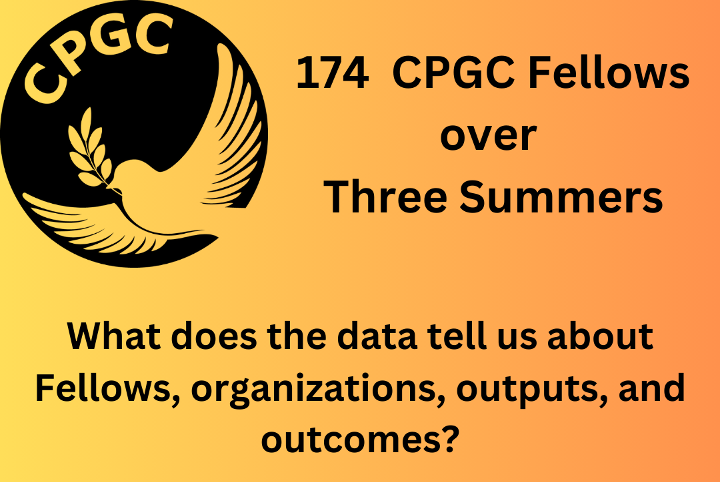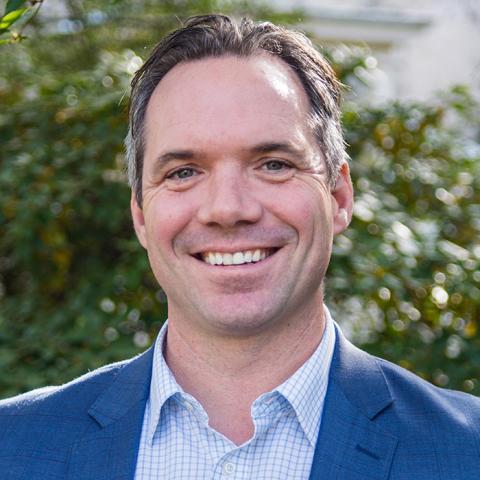Data Dive: What is the value of a CPGC Fellowship?

Details
Who participates in CPGC Fellowships? What majors are most present? Are partner organizations happy with interns? How might we think about the value of internships for organizations and for students? Looking across the last three years of CPGC Fellowship data demonstrates clear trends coupled with considerable flexibility.
Since 2022, the CPGC has supported 174 students with Fellowships around the world, across majors and sectors, all intersecting with the themes of peace, justice, inclusion, and sustainability. These eight to ten week summer fellowships provide a $4,000 summer stipend; roughly half provide additional resources to address some room, board, program, or flight costs.
What students were awarded Fellowships?
- One-third (33%) of Fellows are Chesick Scholars, part of the program for first generation or low-income students at Haverford.
- 60% of Fellows identify as non-white, including self-identification as Black (7%), Latinx (15%), Asian (13%), and multiracial (8%). 17% identify as international students, who together represent extraordinary diversity.
- Fellows are academically diverse, representing 32 different majors, 35 different minors, and 7 distinct concentrations across Haverford and Bryn Mawr Colleges.
Where did Fellows intern?
- Fellows worked with 93 different organizations, listed here for 2022, 2023, and 2024.
- 57 Fellows interned in the Philadelphia Region, while the remaining 117 worked across 14 different states, districts, and territories, in addition to 20 different countries.
Were organizations satisfied with Fellows, and what kind of value did Fellows contribute?
- Between 2022 and 2024, 97% of organizations were satisfied with their Fellows. End of year surveys of organizational hosts indicate 25% of Fellows met expectations, while 72% of Fellows exceeded expectations. In less than 3% of cases, the organization indicated a need for improvement. The CPGC always follows-up and makes adjustments based on critical and positive feedback.
What is the impact of CPGC Fellowships?
- Fellows contributed nearly 25,000 hours of labor from 2022-2024. Work hours vary slightly, but it is reasonable to calculate cumulative hours based on Fellows working 35 hours per week for 8 weeks. At that rate, 174 Fellows contributed 24,360 hours.
- Fellows contributed more than $700,000 in labor value. This calculation is based on multiplying hours worked by an hourly wage. The Independent Sector estimates the average value of volunteer time at $33.49, based on an average of private sector wages. The CPGC wanted a better estimate, however, recognizing our population is particularly young, early career, but also high performing in comparison with peers across the country. Fellows perform a range of professional tasks, including coding, researching, summarizing reports, writing articles, overseeing young people, developing programs, assisting clients with legal documents, translating, and much more. The Federal Reserve Bank of New York calculated the average salary among recent college graduates in 2023, determining it was $60,000 or $28.85 per hour. At the independent sector volunteer time rate, CPGC Fellows contributed $815,816 in value; at the Federal Reserve rate for recent college graduates, CPGC Fellows contributed $702,786 in value.
What are the specific outputs and outcomes for organizations?
The deliberate diversity of CPGC programming and partnerships makes measurement difficult, but the overall satisfaction rates above, coupled with clarity on the organizational types (2022, 2023, and 2024) indicate CPGC Fellows are advancing justice, inclusion, and sustainability work. A small sampling of partners’ summary of Fellow contributions, with student names excerpted, appears below:
- [CPGC Fellow] helped to file dozens of applications. Green cards, travel documents, family petitions, work permits and more.
- Assisted in the selection of potential site/s to pilot identified restoration approaches; Introduced team to relevant restoration aspects, such as fauna assessments from experiences in the United States; Assisted with local community core group selection; Assisted in capacity-building trainings in collaboration with the technical team; Identified potential approaches to engage communities in monitoring restoration and data collection; Developing educational material in collaboration with the technical team; Follow up and conducted assessment; Assisted in communications and reporting; Assist the team with English proofreading writing and/or revising proposals; Trained the team on the use of R software.
- Helped track/update wasted votes in presidential primaries. Tracked and analyzed all federal primary runoffs, conducted FOIA requests to analyze the cost of runoffs, and put the insights together in a report. Wrote a report on cross-endorsements/joint campaigning, using case studies and cast vote record analysis. Contributed (big time!) to the research team’s RCV [Ranked Choice Voting] Concerns project. Finished the 100 biggest cities project! Contributed original insight to the research team’s weekly book club. Wrote blog posts on Arlington’s 2nd RCV election, Stacey Abrams endorsement, and new CT task force. Reviewed the charter review processes for the 25 biggest cities in order to identify opportunities for proportional RCV.
- [CPGC Fellow] was a great friend and mentor to our underserved youth. He helped a ton on free community boating days, free family fishing, and much more. He helped run educational field trips, scientific water testing, and youth empowerment programs.
- [CPGC Fellow] has provided administrative support to various departments within the Embassy, including the Ambassador's Office, where she has drafted and edited political and economic reports, and the Consular Department, where she has handled the translation and proofreading of official documents.
What about students? Do these fellowships translate to clear opportunities?
A survey of CPGC alumni, including graduates from the 2010s and 20s, indicated more than 90% recognized CPGC experiences prepared them for their career. Career pathways were extraordinarily diverse, including reflections from the corporate and social sectors. For instance,
- “In my exit interview for Haverford, I cited CPGC as one of the two defining experiences of my college years. It was an opportunity I would not have sought or been able to finance if not for the foresight of those Haverford folks who created the CPGC. Thank you!” - Matthew Cebul ‘13, Research Officer, Program on Nonviolent Action and Peacebuilding, United States Institute of Peace
- “The CPGC provided me with one of the most important experiences of my life. It didn't just change/expand my views, it also changed how I ask questions, and how I evaluate problems.” - Corey Chao ‘08, Head of the Public Spaces Incubator, New_Public
- Natalie Wossene ’08, Senior Director, Azure Marketing at Microsoft, shared how the skills that she developed through her CPGC experiences prepared her for the corporate sector: “You’re frequently working in a complex stakeholder environment where you need to get things approved but don’t always have formal power, [so] you have to be scrappy to mobilize resources for your projects, and you have to be human-centered to build strong teams.”
- “The CPGC was the most unique and transformative experience I had at Haverford. As someone who was interested in international work, the opportunity to build professional experience abroad was unparalleled.” - Kirsten Mullin ‘19, Senior Associate, North and West Africa, DAI
- “Through my involvement in various CPGC programs, I was able to gain experience working in the legal nonprofit realm, conducting community-engaged research for my Political Science thesis, as well as exposure to inclusive networking events that built my confidence in a really meaningful way. When it became time for me to look for post-grad employment, I was able to reflect thoughtfully on my work at the CPGC, its impact, and how I could continue to promote a social justice framework in other jobs.”- Natasha Bansal ’23, Paralegal Specialist, U.S. Department of Justice, Civil Rights Division
To 174 Fellows, nearly 100 partner organizations, many scores of faculty collaborators and references, the CPGC Staff Members, and the broader community that supports these learning opportunities aligning young people’s time, talent, and career development interest with justice organizations’ mission and activities - THANK YOU!




